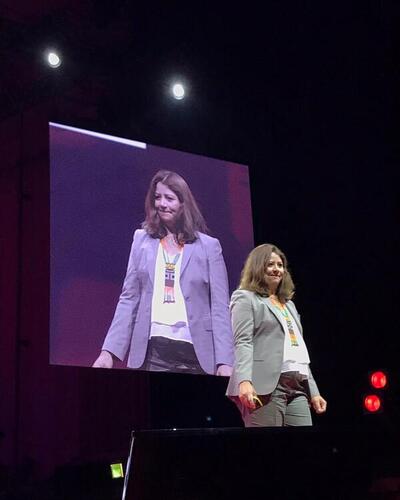- E-mailvera.sinha@uib.no
- Phone+47 55 58 86 76
- Visitor AddressChristies gate 125015 Bergen
- Postal AddressPostboks 78075020 Bergen
Language, culture and mind:
Keywords: time, number, culture, environment, self and cognition
My research topics innovatively combine linguistics, linguistic anthropology and cognition. This interdisciplinary approach inform leading-edge research into the cultural diversity of human cognition. Additionally, my research also helps in the development of research that will be useful for teaching culture and language documentation, especially to the communities involved in the research. My research topics are built upon my experience in field research, indigenous community engagement in South America and interdisciplinary work and develops new directions for research topics such as environment and ecological cognition, indigenous teaching and learning, ethnomathematics, autobiographical narrative.
SILVA SINHA, V. da. (2022). Time: Sociocultural structuring beyond the spatialization paradigm. In Svenja Völkel & Nico Nassenstein (eds). Approaches to Language and Culture. De Gruyter Mouton.
SILVA SINHA, V. da and Mello, H. (2022). Indexicalization and lexicalisation of event-based time intervals in Huni Kuĩ, Awetý and Kamaiurá, in Ulrike Schröder, Milene Oliveira, and Adriana Tenuta (eds.) (Inter)Cultural perspectives on metaphorical conceptualisations. De Gruyter Mouton.
SILVA SINHA, V. da. and Sampaio. W. (2022). Mother-Tongue Language Education With Indigenous Teachers In Training: Projeto Açaí. In Riitta Valijärvi and Lily Kahn (eds). Teaching and Learning Resources for Endangered Languages. FEL and EL Publishing (http://www.elpublishing.org/).
Rubim, A. SILVA SINHA, Sampaio. W. (2021). Educação Escolar Indígena no Brasil em tempo de Pandemia. In Costa, P. L. (ed). EDUCAÇÃO d.C o papel das mulheres nesse desafio. 133. Estúdio Par ou Ímpar, Belo Horizonte.
Pissinatti, L. G., Samapaio, W. SILVA SINHA, V. da. (2021) Narrativas de Resistência na Literatura Infanto-Juvenil: A Cultura Como Estratégia Descolonizadora. In Sampaio, S. M. G., Nogueira, M. G. C., & Pissinatti, L. G. (Eds). Escritos das Margens e suas Vozes. 194. Editora da Universidade Federal de Rondônia.
SILVA SINHA, Vera da, Moreno Núñez, A., Tian, Z. (2020) Introduction to Language, Culture and Identity: Signs of Life. Cognitive Linguistics Studies in Cultural Contexts Series 13. Amsterdam: John Benjamins, pp. 1-6.
Sampaio, W., SILVA SINHA, V. da and Sinha, C. (2020). Embodiment, personification, identity: Metaphor and world view in a Brazilian Tupian culture and language. In Vera da Silva Sinha, Ana Moreno Núñez and Zhen Tian (eds.) Language, Culture and Identity: Signs of Life. Cognitive Linguistics Studies in Cultural Contexts Series 13. Amsterdam: John Benjamins, pp. 179-200.
SILVA SINHA, Vera da, Moreno Núñez, A., Tian, Z. (Eds.) (2020) Language, Culture and Identity: Signs of Life. Cognitive Linguistics Studies in Cultural Contexts Series 13. Amsterdam: John Benjamins. 314 + viii pp. https://benjamins.com/catalog/clscc.13?fbclid=IwAR3Bk0aaTInwyqaljGalceuDI64jvqN5gGXeI-9xuol_bViUQk8pvxX1VF0
SILVA SINHA, Vera da, Moreno Núñez, A., Tian, Z. (Eds.) (2020) Language, Culture and Identity: Signs of Life. Cognitive Linguistics Studies in Cultural Contexts Series 13. Amsterdam: John Benjamins. 314 + viii pp. https://benjamins.com/catalog/clscc.13?fbclid=IwAR3Bk0aaTInwyqaljGalceuDI64jvqN5gGXeI-9xuol_bViUQk8pvxX1VF0
SILVA SINHA, V. da. (2019) Event-based time in three indigenous Amazonian and Xinguan cultures of Brazil. Frontiers in Psychology (Section Cultural Psychology) 10, 454 1-21. doi: 10.3389/fpsyg.2019.00454
SILVA SINHA, V. da, Sampaio, W. Sinha, C. (2017). The many ways to count the world: counting terms in indigenous languages and cultures of Rondônia. Brief Encounters 1.1 DOI: h9p://dx.doi.org/10.24134/be.v1i1. http://briefencounters-journal.co.uk
Sampaio, W., Sinha, C., SILVA SINHA, V da. and Zinken, J. (2017). A noção de tempo: uma construção social e linguística. Revista Brasileira de Linguística Antropológica 8.1: 47-60.
Cabral, S. Sampaio, SILVA SINHA V. da. (2016) Indigenous Language Policies in Brazil: Training Indigenous People as Teachers and Researchers. In Martin Pütz and Luna Filipovic (eds.) Endangered Languages and Languages in Danger: Issues of documentation, policy and language rights. IMPACT Series: Studies in Language and Society. Amsterdam, John Benjamins, pp. 45-59.
Sinha, C., SILVA SINHA, V. da, Zinken, J. and Sampaio, W. (2016). When Time is not space: The social and linguistic construction of time intervals and temporal event relations in an Amazonian culture (Revised and reprinted version of Sinha et al. 2011). In Lewandowska-Tomaszczyk, B. (Ed.) Conceptualisations of Time. Human Cognitive Processing Series 52. Amsterdam, John Benjamins, pp. 151-186.
SILVA SINHA, V. da, Sinha, C., Sampaio, W. and Zinken, J. (2012) Event-based time intervals in an Amazonian culture. In Filipović, L. and Jaszczolt, K. (Eds.) Space and Time in Languages and Cultures II: Language, Culture, and Cognition. Human Cognitive Processing Series 37. Amsterdam: John Benjamins, pp. 15-35.
Sinha, C., SILVA SINHA, V. da, Zinken, J. and Sampaio, W. (2011) When Time is not Space: The social and linguistic construction of time intervals and temporal event relations in an Amazonian culture. Language and Cognition 3(1): 137-169. DOI 10.1515/ LANGCOG.2011.006.
Sampaio, W., Sinha, C. & SILVA SINHA, V. da. (2009) Mixing and mapping: motion, path and manner in Amondawa. In Jiansheng Guo, Elena Lieven, Nancy Budwig, Susan Ervin-Tripp, Kei Nakamura, Şeyda Őzçalişkan (eds.) Crosslinguistic Approaches to the Study of Language. Research in the tradition of Dan Isaac Slobin. London and New York: Psychology Press, pp. 427-439.
TINCULT
The relationship between concepts of time and number in human cognition is receiving increasing attention, but little is known about this in small-scale traditional societies speaking endangered languages. To fill this knowledge gap, the EU-funded TINCULT project will conduct a field-based investigation in three minority indigenous communities of Brazil. The languages of these communities have small number systems (less than five basic numerals). There are no metric (number-based) time measurement systems such as calendars or clocks. The findings of this project will not only increase our scientific understanding of time and number cognition, they will also be vital resources for indigenous education and language/culture revitalisation. We will also gain a better understanding of knowledge of human-environment relations in traditional societies.
